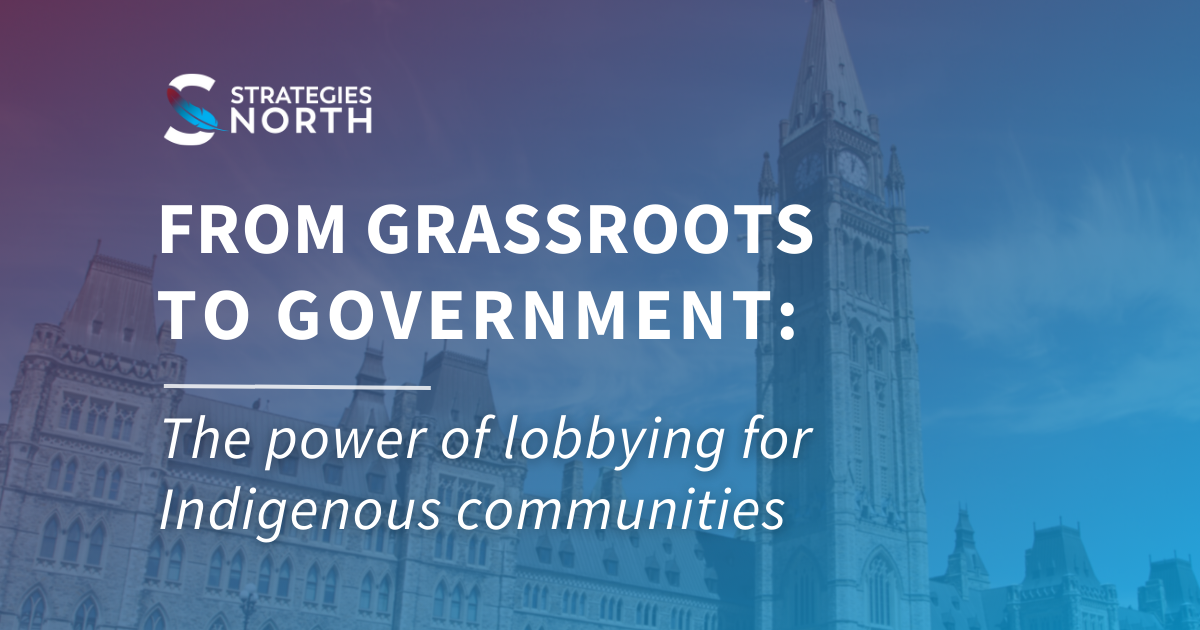From grassroots to government: The power of lobbying for Indigenous communities

Grant applications certainly have an important place in funding strategies, but sometimes the best way to secure crucial financial and political support is to go straight to the source.
Lobbying is direct interactions with governments to influence decisions. While it can seem like an intimidating process, it all comes down to the ability to build relationships and communicate needs and solutions.
Since developing our own largely unique strategy for lobbying in 2017, Strategies North’s Lobbying Service has grown into an important tool for accessing funding and realizing innovative projects in First Nations communities.
Strategies North President Grant Barley and Policy Advisor Austin Glover – both registered lobbyists – know all about the ins and outs of facilitating government-to-government relationships.
“Lobbying in general from a Strategies North perspective is a little different than what most people would think about lobbying. Certainly it’s not anything like what you would see on television or read in a book,” Grant said.
“Our role in lobbying generally is advocacy and relationship-building with the purpose of furthering a government-to-government relationship between our clients and senior staff and political officials, both federally and provincially.”
Austin said that SN began seeing the need for direct government interactions after dealing with shortfalls in traditional funding programs. As any community knows, many of the federal government’s funding programs are not tailored to the needs or realities of Indigenous communities, resulting in frustrating roadblocks.
“When INAC split into ISC and CIRNAC in 2015, they had ridiculous requirements on proposals that assumed First Nations communities had similar capacity to cities and municipalities,” he said. “So we started talking to funders and their higher ups [about their expectations] and one thing led to another.”
Today, almost every government department has a political mandate to support Indigenous-led economic and social development. When a community recognizes a need that isn’t covered by a regular funding program, or is dealing with a particular complex or long-term issue, lobbying may be a good next step to pursue.
Working as a liaison between community and the government, SN works to coordinate in-person meetings in Ottawa with the goal of fostering crucial personal and government-to- government relationships between First Nation leadership and Federal and Provincial Ministers and staff. Now, SN accompanies clients during lobbying trips SN accompanies clients and provides pre-and-post meeting support, or a more active role in the discussion depending on the circumstances and needs of the specific client.
“We’ve been asked sometimes by Chiefs to lead the conversation, but the nice thing with that is after [they have] two or three meetings under their belt, they realize that it’s not quite as daunting as they imagined and they are more comfortable,” Grant said.
“Our role is to increasingly be much more in the background. We want our clients to be the stars of the meeting. The ideal scenario is we speak during introductions and at closing and our client is prepared and comfortable enough to carry the conversation and get what their nation needs out of that meeting.”
Lobbying can be a logistical challenge – in-depth preparation, planning travel, scheduling meetings, and even accounting for the weather. While in Ottawa, the busy nature of lobbying trip itineraries is often exhausting.
“It takes you out of everything else you’re doing,” Austin said. “It’s kind of an all day, all night thing.”
But when a client has a well thought out solution to a problem that it believes in, lobbying is almost always worth the work.
“It brings in millions of dollars in opportunities that probably would be a struggle to see get across the line,” Grant said, adding that SN’s lobbying work can also benefit government employees who want to make a difference.
Recently, SN supported a client who received almost five million dollars for residential school community healing initiatives. It all started with meaningful government-to-government conversations on a trip to Ottawa.
“Everybody wants their job to mean something, and sometimes when you get into massive organizations, like government, you don’t have that opportunity or you don’t feel like you have that opportunity,” Grant said. “[Lobbying provides] them a path where they can be a party to the success of a particular Nation.”
Austin said that there is growing interest in lobbying among First Nations of all sizes as they increasingly see the value in government to government relations and other Nations getting results out of it, which hasn’t always been the case.
“A lot of the nations that come here to Ottawa for the first time, I talk to them and they say, ‘our last Chief and Council or even our nation has been silent on this front for too long,’ or ‘we don’t go to those tables because we have to fix our problems in our own backyard,’” he said.
“I think that’s rapidly changing and they’re realizing those aren’t mutually exclusive and you can work on your own local issues and actually dovetail those with government relations when you have time, so I think there’s been a big change that way.”
If you are interested in learning more about Strategies North’s Lobbying Services, contact Grant Barley at grant@strategiesnorth.ca.